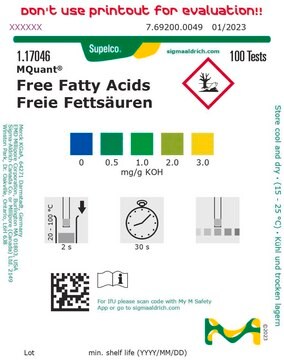MAK156
Fatty Acid Uptake Kit
sufficient for 100 fluorometric tests
Anmeldenzur Ansicht organisationsspezifischer und vertraglich vereinbarter Preise
Alle Fotos(2)
About This Item
Empfohlene Produkte
Verwendung
sufficient for 100 fluorometric tests
Nachweisverfahren
fluorometric
Relevante Krankheit(en)
endocrinological disorders, diabetes; gastrointestinal diseases; cancer
Lagertemp.
−20°C
Verwandte Kategorien
Allgemeine Beschreibung
Fatty acids are critical for many biological processes including energy metabolism and the synthesis of structural cellular components. The facilitated uptake of fatty acids, presumably through fatty acid transport proteins, is thought to be regulated at multiple levels. The dysregulation of fatty acid uptake may contribute to diseases such as obesity, type 2 diabetes, and hepatic steatosis.
Eignung
This kit is suitable for the measurement of fatty acid uptake in cells containing fatty acid transporters
Prinzip
This kit is provides a simple and sensitive method for the measurement of fatty acid uptake in cells containing fatty acid transporters. This kit uses a proprietary dodecanoic acid fluorescent fatty acid substrate whose uptake into cells result in an increase in fluorescence intensity (λex = 485/λem = 515 nm).
Lagerklassenschlüssel
10 - Combustible liquids
Analysenzertifikate (COA)
Suchen Sie nach Analysenzertifikate (COA), indem Sie die Lot-/Chargennummer des Produkts eingeben. Lot- und Chargennummern sind auf dem Produktetikett hinter den Wörtern ‘Lot’ oder ‘Batch’ (Lot oder Charge) zu finden.
Besitzen Sie dieses Produkt bereits?
In der Dokumentenbibliothek finden Sie die Dokumentation zu den Produkten, die Sie kürzlich erworben haben.
Stephanie Kim et al.
Environmental health perspectives, 129(7), 77006-77006 (2021-07-30)
Chemicals in disparate structural classes activate specific subsets of the transcriptional programs of peroxisome proliferator-activated receptor-γ (PPARγ) to generate adipocytes with distinct phenotypes. Our objectives were to a) establish a novel classification method to predict PPARγ ligands and modifying chemicals;
Mona S Nilsen et al.
Diabetes, 69(9), 1903-1916 (2020-06-27)
Circulating branched-chain amino acids (BCAAs) associate with insulin resistance and type 2 diabetes. 3-Hydroxyisobutyrate (3-HIB) is a catabolic intermediate of the BCAA valine. In this study, we show that in a cohort of 4,942 men and women, circulating 3-HIB is
Rong Huang et al.
JCI insight, 4(18) (2019-09-20)
Age is a well-established risk factor for impaired bone fracture healing. Here, we identify a role for apolipoprotein E (ApoE) in age-associated impairment of bone fracture healing and osteoblast differentiation, and we investigate the mechanism by which ApoE alters these
Stephanie Kim et al.
Archives of toxicology, 94(9), 3087-3103 (2020-07-20)
Triphenyl phosphate (TPhP) is an environmental PPARγ ligand, and growing evidence suggests that it is a metabolic disruptor. We have shown previously that the structurally similar ligand, tributyltin, does not induce brite adipocyte gene expression. Here, using in vivo and
Xingzhe Ma et al.
Cell metabolism, 33(5), 1001-1012 (2021-03-11)
Understanding the mechanisms underlying how T cells become dysfunctional in a tumor microenvironment (TME) will greatly benefit cancer immunotherapy. We found that increased CD36 expression in tumor-infiltrating CD8+ T cells, which was induced by TME cholesterol, was associated with tumor progression and
Unser Team von Wissenschaftlern verfügt über Erfahrung in allen Forschungsbereichen einschließlich Life Science, Materialwissenschaften, chemischer Synthese, Chromatographie, Analytik und vielen mehr..
Setzen Sie sich mit dem technischen Dienst in Verbindung.




